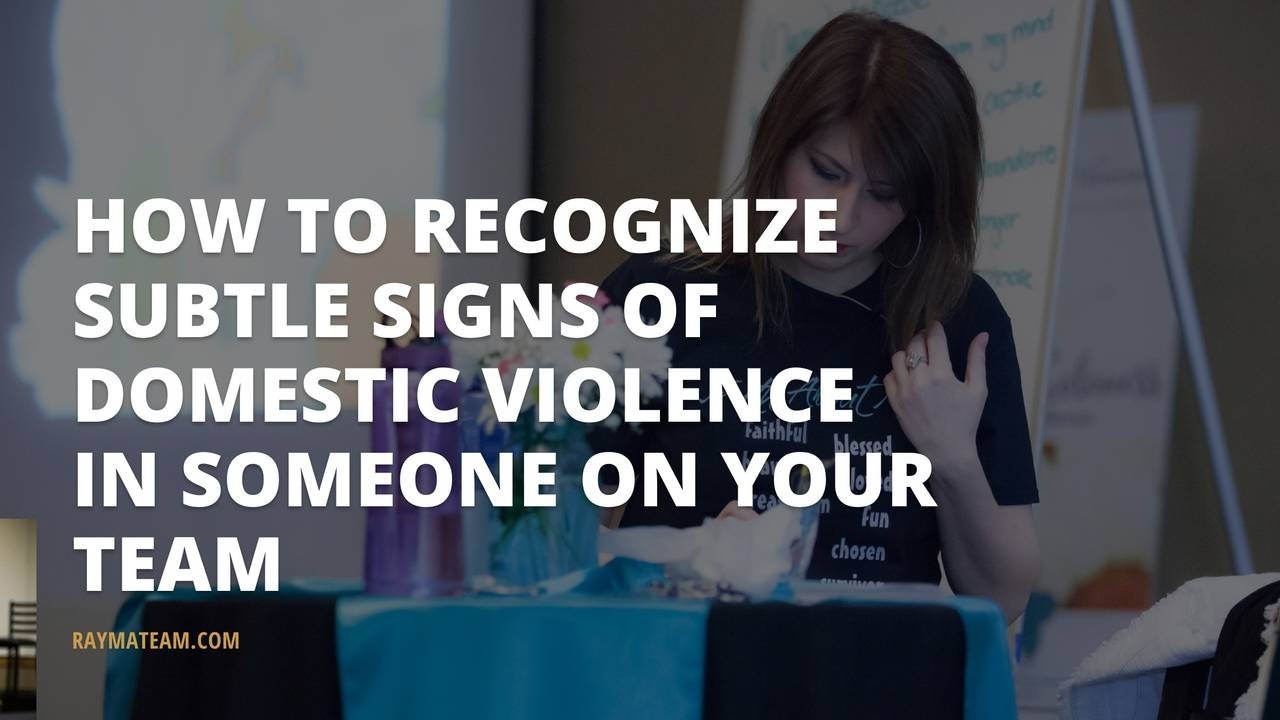How to Recognize Subtle Signs of Domestic Violence in Someone on Your Team
Oct 21, 2022
October is Domestic Violence Awareness Month. Domestic violence is a topic that hits close to home for so many of us. Including myself. Let's talk about some of the subtle signs of domestic violence in someone on your team.
If we've never met before, I'm Raychel Perman and I'm the Co-Founder RAYMA Team and the Co-Creator of RAYMA Foundations™. We're on a mission to revolutionize how leadership development is done.
Chances are you know someone right now in an abusive relationship and you just can’t see past the painted surface to the evil underneath. When it comes to domestic violence there are lots of scars you can’t see. Abuse is often hidden in plain sight. Many abusive relationships look happy marriages from the outside. Or, even like the couple is working to overcome their differences.
So, to help spread domestic violence awareness, foster healing for survivors, and create a safe place for hard conversations in the office, let’s start talking about it.
Want to watch the LIVE training replay? Click the LINK HERE.
Here are the numbers on domestic violence in America:
- On average, nearly 20 people per minute are physically abused by an intimate partner in the United States. During one year, this equates to more than 10 million women and men.
- 43.8% of lesbian women and 61.1% of bisexual women have experienced rape, physical violence, and/or stalking by an intimate partner at some point in their lifetime, as opposed to 35% of heterosexual women.
- 26% of gay men and 37.3% of bisexual men have experienced rape, physical violence, and/or stalking by an intimate partner in their lifetime, in comparison to 29% of heterosexual men.
Believe in or not, Domestic violence has far-reaching consequences for your company and the economy!
It’s always shocking when you find out someone you know, and love has been the victim of domestic violence. One of the first questions people often ask is, “Why didn’t they leave sooner?” The #1 reason they stayed…Financial abuse. In fact, it’s reported that 98% of domestic violence cases include some form of financial abuse.
If the abuser controls the money supply, they cut off the resources for anyone to leave. It is because of this that many women and children who escape abusive relationships end up homeless. Domestic violence is the third leading cause of homelessness among families.
- Victims of intimate partner violence lose a total of 8.0 million days of paid work each year.
- The cost of intimate partner violence exceeds $8.3 billion per year.
- Between 21-60% of victims of intimate partner violence lose their jobs due to reasons stemming from the abuse.
Because MOST of these people will never report their abusers or involve the police we need to create safe spaces for them to build the resources, finances, and strength to leave. Honestly, the reasons people don't leave are as varied as the people involved. But some major themes play into many cases where someone declines to report it and/or stays with their abuser:
- Shame to have others know the truth;
- Wanting to protect the batterer
- Belief that he will change or the behavior is justified (e.g., “He drank too much,” “She didn’t actually hit me,” etc.) ;
- Fear of the questioning and not being believed by the police or authorities;
- Fear of retaliation against her, or the children, from their partner; and
- Fear of losing custody of his children.
How to Recognize Subtle signs of Domestic Violence in Someone on Your Team
- Being jumpier or more on guard.
- Complaining about difficulty sleeping or having nightmares.
- Withdrawing and not wanting to be around other people, especially if it's new behavior.
- Losing interest in activities they once liked.
- Having unexplained physical injuries or lots of days of missed work.
- You hear their partner use rough language with them or read it in a text message.
- Their partner makes you feel uncomfortable.
Bottom line... If someone on your team is a victim of domestic violence, you could be their life line if you recognize the subtle signs that show up at the office. IF you see something, say something. Offer to listen and believe them when they tell you something. As leaders we can make a difference in these numbers if we remain aware that domestic violence is happening all around us.
~Coach Raychel
Statistics come from the National Coalition Against Domestic Violence
https://ncadv.org/STATISTICS
https://ncadv.org/blog/posts/domestic-violence-and-the-lgbtq-community

